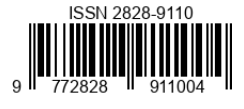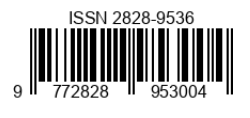Standar Resep Dekonstruksi Asinan Bogor Dalam Menghadapi NHI Tourism Skill Competition Menjadi Fusion Appetizer
DOI:
https://doi.org/10.56910/nawasena.v3i1.1337Keywords:
Food Reconstruction, Standard RecipeAbstract
Indonesia which stretches from Sabang to Merauke has various types of culinary flavors, diversity from how to process food and beverages and the mention of food and beverage names characterize their respective places or regions. The rapid development of Indonesian culinary is also recognized by the international world, some Indonesian foods that are recognized as the most delicious foods in the world, namely Rendang, Fried Rice, Satay, Soto, Gado-gado, Pempek, Serabi, Pisang Goreng, Lupis and Cenil. Nowadays a new trend has emerged where in presenting food when plating is strongly influenced by art and aesthetics to make the food value-added, because the author is interested in deconstructing Asinan Bogor in the face of the NHI Tourism Skill Competition (NTSC) event. This research uses a qualitative approach with an analytical descriptive type of research. And using observation methods, interview methods, and literature study methods. Research samples were taken by competition participants. Data collection was carried out by directly observing the use of standard recipes in deconstructing Asinan Bogor. The results showed (1) by deconstructing Asinan Bogor into Fusion Food can increase students' self-esteem in participating in competitions at the NHI Tourism Skill Competition (NTSC) event, in addition to preserving traditional food. (2) the application of the deconstruction of Asinan Bogor into Indonesia Appetizer. (3) Participants of the competition succeeded in decomposing a dish into its own components or ingredients and served in a new way, this is evidenced by the first taste panel and changed to a new and creative way dish at the time of the second and third taste panels and during the Indonesia Appetizer competition using the Bogor Asinan Deconstruction.
References
Bahasa, B. P. (2016). Badan Pengembangan dan Pembinaan Bahasa. Retrieved January 2024, from Badan Pengembangan dan Pembinaan Bahasa: kbbi.kemendikbud.go.id
Fajriana, M. (2015). Lakupon Gelar Kampanye Kuliner Lokal Khas Indonesia. https://www.liputan6.com/lifestyle/read/2225642/lakupon-gelar-kampanye-kuliner-lokal-khas-indonesia
Ferran, A. (2011). The Family Meal: Home Cooking with Ferran Adria
Heston, B. (2008). The Fat Duck Cookbook
Kamus Besar Bahasa Indonesia (KBBI)
Komariah, H.S. (2003). Resep dan Menu. Yogyakarta: CV BUDI UTAMA
Muri. (2017). Metode Penelitian Kuantitatif Kualitatif dan penelitian gabungan.Jakarta: Kencana
Tribun Medan. (2024). Kampanye Cinta Kuliner Nusantara, Komunitas Boemi Poetra Bagi Dodol di Jalan. https://medan.tribunnews.com/2016/03/04/kampanye-cinta-kuliner-nusantara-komunitas-boemi-poetra-bagi-dodol-di-jalan
Samsu. (2007). Metode Penelitian, Teori dan Aplikasi Penelitian Kualitatif, Kuantitatif, Mixed Methods serta Research dan Depelovment. Jambi: Pusaka Jambi
Steffen Schneider. (2019). Food Deconstruction: A New Approach to Modernist Cuisine
Sugioyo. (2013). Metode Penelitian Kuantitatif Kualitatif dan R&D. Bandung: Alfabeta
https://www.kompas.com/skola/read/2019/12/27/150000569/pengertian-hotel-dan karakteristiknya?page=all)
Downloads
Published
How to Cite
Issue
Section
License
Copyright (c) 2024 NAWASENA : Jurnal Ilmiah Pariwisata

This work is licensed under a Creative Commons Attribution-ShareAlike 4.0 International License.








